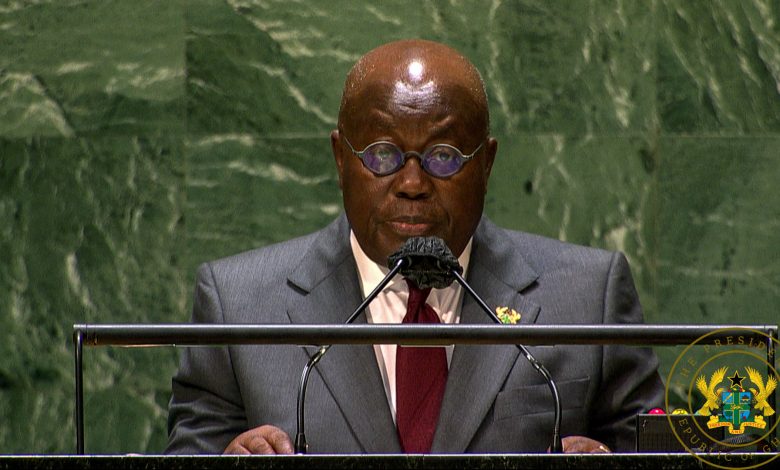“Our common humanity and existence depend on countering terrorism and violent extremism” – Prez. Akufo-Addo

The President of the Republic, Nana Addo Dankwa Akufo-Addo, on Tuesday, 28th March 2023, urged the United Nations Security Council and the global community to make the fight against terrorism and violent extremism a topmost priority.
Speaking at the UN Security Council Chamber at the United Nations Headquarters in New York, His Excellency Nana Addo Dankwa Akufo-Addo, whilst reaffirming Ghana’s commitment to the fight against the global canker, also emphasized the urgent need for terrorism and violent extremism to be fought.
According to the President, the most recent report of the Secretary General on the threat posed by Da’esh to the international community, which was released in February this year, as well as the 2022 Global Terrorism Index, and the 2022 report of the African Centre for the Study and Research on Terrorism, all speak about an increase in the incidence of terrorism and violent extremism across Africa, with an attendant evolution in their modes of operation. Indeed, data on casualties on the continent is, particularly, sobering.
“It is for these reasons that Ghana reaffirms her condemnation of all acts of extremism and terrorism and urges the civilised world to do the same. Our common humanity and existence depend on it’’, he stated.
He also bemoaned the steady transformation of Africa into an arena for violent extremism and terrorism.
To this end, President Akufo-Addo stressed the need for partnership across all levels, from the local to the regional to the global, stressing that the effectiveness of the United Nations now more than ever, rests on a co-operation that is both deeper and more robust with regional organisations.
He, thus, highlighted some points that can help in the fight against terrorism and violent extremism.
“First, the rise of violent extremism and terrorism underscores the urgent need for a collective response. No country, regardless of its might, is immune from the scourge of terrorism and violent extremism, nor can one country alone respond effectively to such threats. In a rapidly changing world, enhanced co-operation between the United Nations and continental and regional organisations is needed to combat these emerging threats to international peace and security. The partnership, outlined in Chapter Eight of the United Nations Charter, has always been an important factor in preserving international peace and security, and reinforcing our shared aspirations for global peace and security’’.
He continued, “Secondly, in Africa, we have decided to fill the void by addressing the limitations that United Nations peacekeeping efforts and national capacities have in dealing with the menace of transnational terrorist threats. In order to combat insurgencies in their respective regions, African regional organisations, such as the SADC and ECOWAS, have developed their unique operations, which include both military and diplomatic initiatives. The Accra Initiative, which groups together Ghana, Cote d’Ivoire, Togo, Benin, Mali and Burkina Faso, and, hopefully, soon, Nigeria, is one such self-help regional security and intelligence mechanism, designed to assist in the fight against terrorism’’.
The desire for these named countries to contribute their quota to the fight against terrorism and violent extremist, there are, nonetheless, some constraints he outlined which are militating against these efforts.
“Yet, capacity limitations and a lack of financial resources have become significant obstacles in the fight against terrorists. Previous experiences with peacekeeping in Africa have shown us the difficulties in delivering ambitious but under-resourced mandates. Defeating terrorist organisations and armed groups should be the Council’s primary focus when addressing the security challenges currently confronting Africa’’ he said.
His Excellency Nana Akufo-Addo also said that bolstering co-operation and collaboration between the United Nations, continental and regional organisations should leverage existing strengths to enhance the development of a preventative approach, based on regional early warning mechanisms. Efforts in conflict prevention and mediation have demonstrated how working together increases our powers of persuasion to press parties to make peace and diffuse tensions in localities.
‘’Fourthly, it is important that partnerships with regional organisations are based on mutual respect and must not attempt to impose preferred approaches on unique regional circumstances. Where this is forced through, it can only be detrimental to the work of regional organizations and the global effort to defeat terrorism. Indeed, our collective security demands that we find the will to act collaboratively and decisively, in line with the respective mandates, to defeat terrorism and violent extremism in Africa. The activities of the United Nations, the African Union and other regional organizations should complement each other’’ he pointed out.
The President also said that it is important to reinforce the capacity of regional organisations for early warning and conflict prevention. This, he said, requires that we enhance cooperation in the areas of intelligence, logistics, capabilities, training and deployment, as well as innovative financing arrangements, for the highest impact projects on our continents with the quickest turnaround results, for peoples’ lives, and for sustainable development.
“Finally, Mr. President, let me place on record my gratitude for your leadership during this high-level meeting, which has established further the urgency needed to enhance co-operation between the UN and Regional Organisations in a meaningful way’’.
He also applauded the Secretary General Antonio Guterres for his thought-provoking address on this very important subject.




